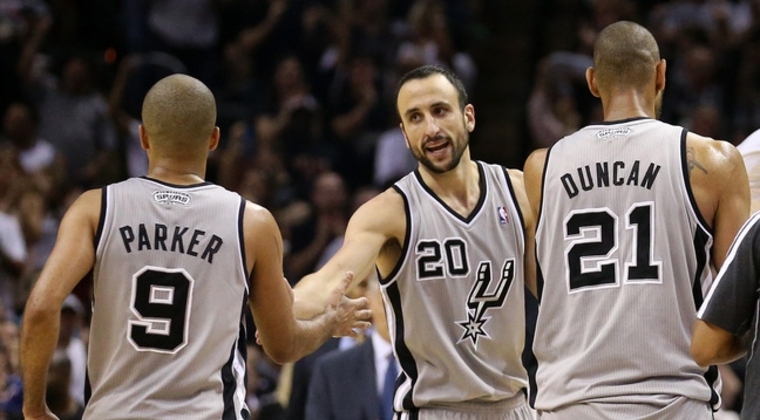 |
| Are these Spurs a true dynasty? |
In no sport is that truer than in the NBA. The NBA, for whatever reason, seems to have more defined dynasties.
- In the 1950s, it was the Minneapolis Lakers. They won five titles in that decade including four in five years from 1950 to 1954.
- In the 1960s, it was the Boston Celtics. From 1957 to 1969, the Celtics won 11 titles and went to the Finals 12 times. Included in that is their record 8 straight titles from 1959-1966.
- In the 1980s, it was the Los Angeles Lakers. They won five titles in the 1980s and went to nine Finals from 1980 to 1991.
- In the 1990s, it was the Chicago Bulls. They won six titles in two separate "three-peats".
- In the 2000s, it was the Los Angeles Lakers. The Lakers won five more titles from 2000 to 2010 and went to seven Finals.
Though there are some smaller dynastic periods mixed in there, those are pretty much agreed on as the main dynasties in the NBA.
That makes what the San Antonio Spurs are doing a bit more curious. The Spurs, of course, are set to face the Miami Heat in the Finals this week. The Spurs are looking for their 5th NBA title and perhaps stopping the Heat's own run at a dynasty. Only the Celtics, Lakers and Bulls have won more titles than the Spurs current total of four.
This Spurs "dynasty" isn't as clean as the others. While I mentioned the dominant nature of those other team's runs, the Spurs don't really own that. The Spurs four titles spanned from 1999 to 2007. That is pretty dynastic -- four titles in nine years. Again, only three other franchises have done anything close to that.
However, the Spurs have never repeated as champions. Until this year, they hadn't even followed up a Finals appearance with another one (and they are coming off a Finals loss). Those five dynasties listed above had a repeat (Lakers 1987-88), several three-peats (Lakers 1952-54, Bulls 1991-93, 1996-98, Lakers 2000-02) and an eight-peat (Celtics 1959-66). The Spurs haven't done that.
Even if they won it this year, that would mean that dynasty period would be five titles in 16 seasons. Not really total domination. Not to mention that feeling of someone doing it better while you were doing it. The Lakers also won five titles during this span and they did so in a tight 11 year period.
That's like the NFL having the Redskins of the 1980s playing second fiddle to the 49ers dynasty. Or the Cowboys, Dolphins and Raiders in the 1970s taking a back seat to the Steelers.
This isn't at all to slam what they've done. The consistency that Greg Popovich and Tim Duncan have had over their 17 years together has been remarkable. Winning a title would cement the legacies of Pop and Duncan as five-time champions and place them truly of the elites of the game ... not that they weren't there already. This is a class organization that routinely takes players that may not be household names and turn them into guys they can use in their system. They are the franchise others are emulating.
Enjoy the Finals. Either way, we will hear a lot of talk about the winner becoming a dynasty.

No comments:
Post a Comment